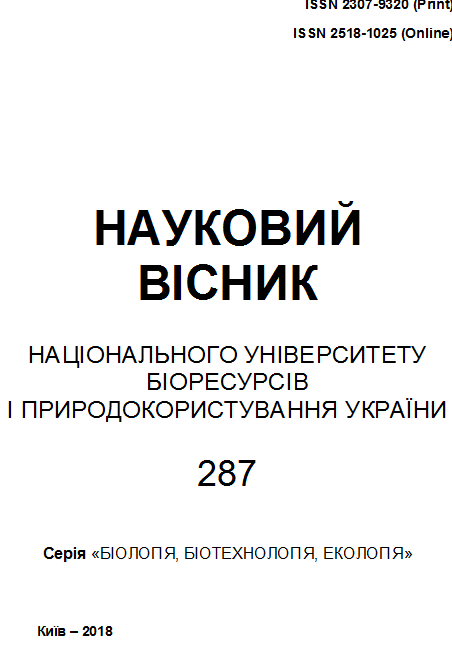METHOD OF CASE STADY ANALYSIS AND DIAGNOSTICS IN PROFESSIONAL PREPARATION OF STUDENTS OF NATURAL DIRECTION
DOI:
https://doi.org/10.31548/biologiya2018.287.053Abstract
Attention is focused on the application of the method of analysis and diagnostics of the situation in the professional training of students of natural sciences. The method is aimed at forming the communicative competences of non-traditional analytical thinking and subject competence of the ecological and biological direction of future specialists. The situation or the case is the basis of the method, which serves as an important criterion for decision making in environmental and biological tasks. Eutrophication of reservoirs is analyzed in the applied aspect with the phased implementation of the case in groups: introduction into the problem situation, distribution of tasks (problem issues) in groups, organization of joint activities of students, analysis and reflection, synthesis of the results of the work and their presentation, formation of conclusions. Implementing the method in practice allows you to use flexibility in making joint decisions with a constant focus on collective critique and the ability to rethink your professional and personal experience.
References
DSTU 3041-95 System of standards in the field of environmental protection and rational use of resources. Hydrosphere. Use and protection of water. Terms and definitions : Order of the State Standard of Ukraine No. 91 dated March 28, 1995, UKRN: 01.040.13; 13.060.01. - 1995. - p. 37
Surmin Yu.P. Situational Analysis or Anatomy of the Case Method / Yu. P. Surmin. - K.: Center for Innovation and Development, 2002. - 236 p.
Skyba M. Application of case-method for formation of constructive and projective skills of ecological-pedagogical activity / M. Skyba // Pedagogical sciences: theory, history, innovative technologies. - 2016. - No. 4. - P. 354-362. - Access mode: http://nbuv.gov.ua/UJRN/pednauk_2016_4_50.
Vaganova O.I. Case study method in vocational training: educational and methodical manual [Electronic resource] / O. I. Vaganova. - N. Novgorod: VGIPU, 2011. - 57 p. - Access mode: https://vgipuvaganova.files.wordpress.com/.../d0b2d0b0d0b3d0b0d0bdd.
Pashchenko T. M. Case method as a modern technology of training of special disciplines [Electronic resource] / T. M. Pashchenko. // Youth and Market: Monthly Scientific and Pedagogical Journal of the Ivan Franko Drohobych State Pedagogical University. - 2015. - Output 8(127). - pp. 94-99. - Mode of access: http://lib.iitta.gov.ua/10441/1/PaschenkoKeyes.pdf
Smolyaninova OG Information Technologies and Case Study Methods in Professional Training of Students at the Pedagogical University [Text] / O. G. Smolyaninova // Proceedings of the II All-Russian scientific-methodical conference "Education XXI century: innovative technologies, diagnostics and management for the purpose of informatization and humanization". Krasnoyarsk, 2000.
Eremin AS The final stage of the analysis of training cases and the assessment of students' work using the case-method / AS Eremin // Innovations in education. - 2010. - No. 8. - P. 120-141.
Grebenkova G.V. Case method in vocational training [Electronic resource] / GV Grebenkova // Proftehosvit Odessa. - 2009. - Vip. 2. - Mode of access : site http://nmc-odessa-com.ucoz.ru/keis-metod.doc.
Downloads
Published
Issue
Section
License
Relationship between right holders and users shall be governed by the terms of the license Creative Commons Attribution – non-commercial – Distribution On Same Conditions 4.0 international (CC BY-NC-SA 4.0):https://creativecommons.org/licenses/by-nc-sa/4.0/deed.uk
Authors who publish with this journal agree to the following terms:
- Authors retain copyright and grant the journal right of first publication with the work simultaneously licensed under a Creative Commons Attribution License that allows others to share the work with an acknowledgement of the work's authorship and initial publication in this journal.
- Authors are able to enter into separate, additional contractual arrangements for the non-exclusive distribution of the journal's published version of the work (e.g., post it to an institutional repository or publish it in a book), with an acknowledgement of its initial publication in this journal.
- Authors are permitted and encouraged to post their work online (e.g., in institutional repositories or on their website) prior to and during the submission process, as it can lead to productive exchanges, as well as earlier and greater citation of published work (See The Effect of Open Access).

